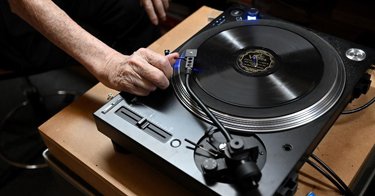The Greatest Collector of Old 78s
78s, Blues, Country Music, Jazz, Joe Bussard, Music
The Washington Post interviews the greatest collector of American roots music on 78 rpm recordings: Blues, Jazz, Country.
FREDERICK, Md. — Joe Bussard stood on the driveway of his home here near the foothills of the Blue Ridge Mountains and glared at a noisy crow perched atop a nearby pine tree. Tall and gaunt with white hair, he wore black sweatpants held up by suspenders, a blue flannel shirt, brown slippers and white socks. He looked all of his 85 years.
“Damn bird,” he muttered. Then he craned his head and hollered.
“CAWWW, CAWWW, CAWWW!”
The startled crow flew away, and Bussard cackled.
“He don’t know what to think of me,” Bussard said, laughing again.
Join the crowd, crow. People have been not knowing what to think about Bussard for decades. His singular obsession has entranced some and baffled others. If you weren’t interested in his passion, Bussard probably wasn’t much interested in you.
He turned and shuffled back inside, through his cluttered garage, past his bedroom that he heats in winter with a wood-fired stove and down the creaky steps to the basement where the treasure is stored.
Since the early 1950s, Bussard (“Everybody thinks it’s pronounced ‘buzzard,’ but it’s Boosard,” he says) has been acquiring 78 rpm recordings of the earliest and rarest examples of blues, bluegrass, jazz, country and gospel music. The collection of discs he has amassed is considered by many fellow collectors as one of the finest and most eclectic of early American roots music in the country. In the basement of his unassuming home, some 15,000 records fill the shelves.
In the world that pays attention to these things, Bussard’s treasure is legendary. Filmmakers have made documentaries about him. Writers have paid homage. Fans and musicians from all over the country have journeyed here just to see the records and listen to Bussard tell how he traveled the back roads of Appalachia and the South to find them. And they come to hear the songs.
But in recent years, as Bussard has gotten older, the fans and musicologists have had questions. Is there a plan for the collection? Has he even thought about it?
Looking for a record on the shelves in his lair, Bussard doesn’t want to hear that kind of talk right now. “Aw hell, I don’t know,” he says, waving his hand dismissively. He’d rather play some music for a visitor.
“Oh my gawd, listen to this,” he says in his thick rural Maryland accent as he gently lowers the needle on a 1929 recording “Wolves Howling” by the Stripling Brothers. “This is the most beautiful sound of a fiddle I ever heard in my life.”
In his basement, time has stopped. There are no computers, no flat-screen televisions. Other than two newer turntables, there’s almost nothing that looks like it was made in the past 50 years. There’s a 300-pound speaker cabinet he bought in 1960, photos on the wall from the ’50s, and rows and rows of records from the ’40s, ’30s and ’20s.
Bussard’s collection “is almost mystical,” says Ken Brooks, a fellow 78 collector who first learned about Bussard when he watched “Desperate Man Blues” a 2003 BBC documentary about him. “It’s so deep and wide. He has blues records that nobody else has. Country records that no one else has. Jazz records that no one else has.”
In the book of Bussard, the spirit and soul and depth of American music can only be heard on the oldest 78s.
Modern music, he’ll tell you often, is ‘awwful, just awwful.” And by modern, he means anything since Elvis Presley and the Beatles and “all that crap” destroyed music altogether. For Bussard, real jazz ended in 1933. And the last good country song was Jimmy Murphy’s “I’m Looking for a Mustard Patch” in 1955.
Before being overwhelmed by vinyl records in the 1950s, 78s were the way most people listened to recorded music in their homes other than on the radio. Typically 10 inches in diameter, three and a half minutes a side and made of shellac, the records are called 78s because of the number of revolutions per minute the disc makes.
In his basement redoubt, Bussard walks over to his wall of records to make another selection. The records are all in identical faded green sleeves with no marking to differentiate them. They are not ordered alphabetically or by year or by label. Only he knows the system.
“If I get Alzheimer’s, I’m really in trouble,” Bussard says.
He pulls another record from the shelf — “Death May Be Your Paycheck,” by F.W. McGee, recorded in 1928 on Victor — and flashes a wicked smile. “Wait till you hear this.”
In the basement of his Frederick, Md. home, Joe Bussard, 85, plays a 78 rpm recording from 1936 of “Everybody Ought To Pray Some Time.” (Video: Joe Heim/The Washington Post)Wait till you hear this. It’s Bussard’s mantra.
What he wants, more than anything, is for people to listen to the far-flung, wild, beautiful music found in America before recordings became commonplace and swallowed up regional idiosyncrasies. He wants people to hear the music created before vinyl, before 8-tracks, before cassettes, before CDs, before one-stop shopping on Spotify.
“Wait till you hear this,” he says and puts on Jesse Stone’s “Starvation Blues” from 1927. And then it’s “Florida Rhythm” by the Ross De Luxe Syncopaters. And “It’s a Good Thing” by the Beale Street Sheiks. And “Original Stack O’ Lee Blues” by Long Cleve Reed and Little Harvey Hull.
And on and on and on.
HT: John W. Brewer.




